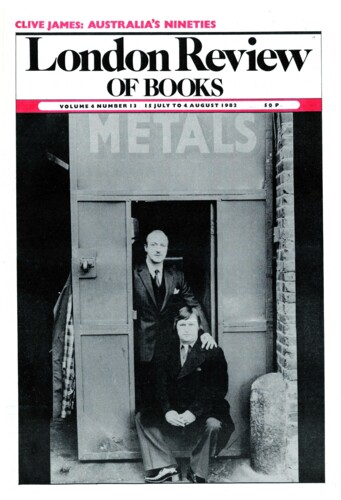My Americas
Donald Davie, 3 September 1981
We have all been told about the demographic shift in the United States from the North-East to the Sun Belt of the South-West; and the commentators on politics have been eager to explain that among the consequences of this shift is the Reagan Presidency. But our perception of US life and letters has not yet been affected; our listening posts on this side of the Atlantic seldom pick up the weak signals from Tucson or Albuquerque, on a wave-band still blanketed by the vociferous transmitters of New York. And perhaps this is just as well: for one shudders to anticipate the strenuously polemical ‘study’, perhaps to appear any day soon, that will see in any sympathetic concern with Spanish-speaking or pueblo cultures only some PR manoeuvre by the Reagan political machine. But of course the chronology won’t fit. Death comes for the Archbishop, though it is remembered by an Anthony Powell character only as the name of a lethal cocktail, is the title of a frail and delicate masterpiece by Willa Cather, that much underrated writer, which more than fifty years ago delineated the shape that North American civilisation would assume in the mind if its metropolis were taken to be, not New York or Boston, Philadelphia or Washington, San Francisco or LA, but what the historical records establish as older than any of them, the most ancient city of North America: Santa Fe, New Mexico. And in the years since, that appealing perspective has never been lost sight of altogether. Rather, because it has never since found a promulgator so powerful and independent as Cather, the vista has been, by the opinion-makers of the North-East, domesticated and trivialised: Santa Fe is acknowledged as a milieu of aesthetes and weirdos, and Texas is handed over to the media-merchants who make Dallas. It is recognised that life in the states of the South-West has taken in the past, and may yet take again, a distinctive shape: but the distinction is dealt with by allowing that the life is, like the landscapes where it happens, picturesque and bizarre. And after all ‘picturesque’ and ‘bizarre’ are epithets that we need not withhold from some of the most alarming Reaganites, or the most impudent of philistines.





